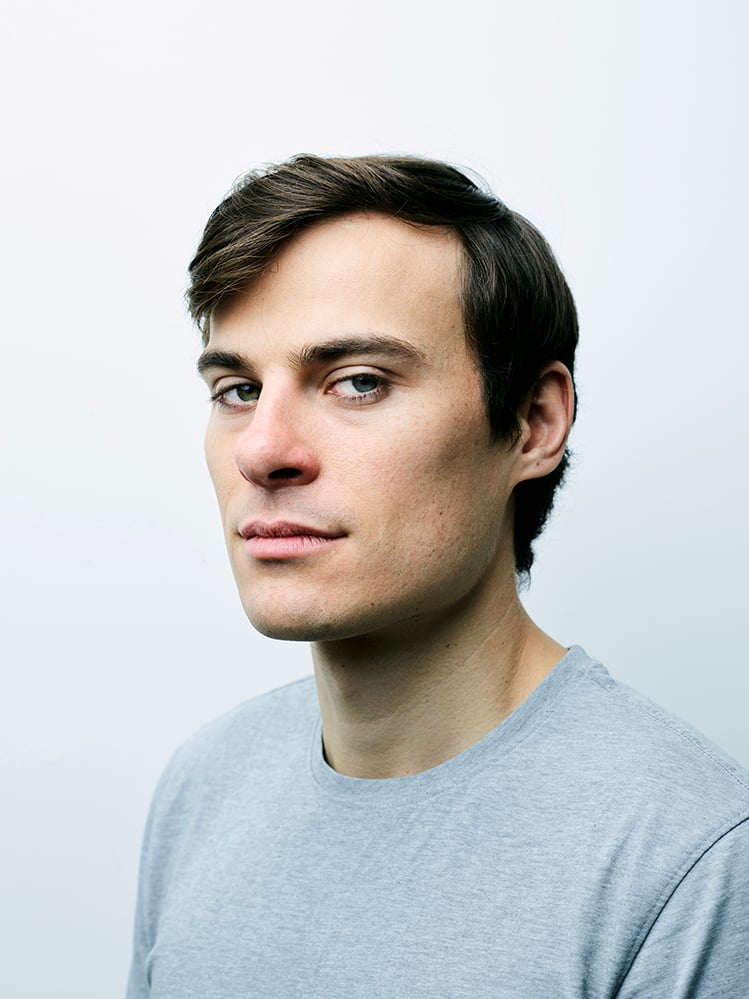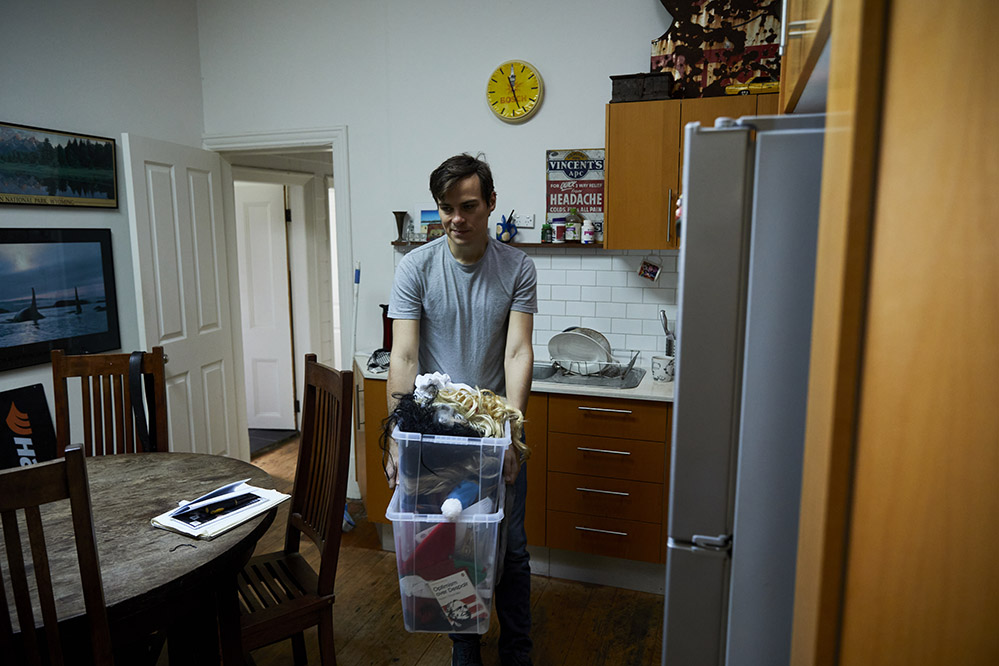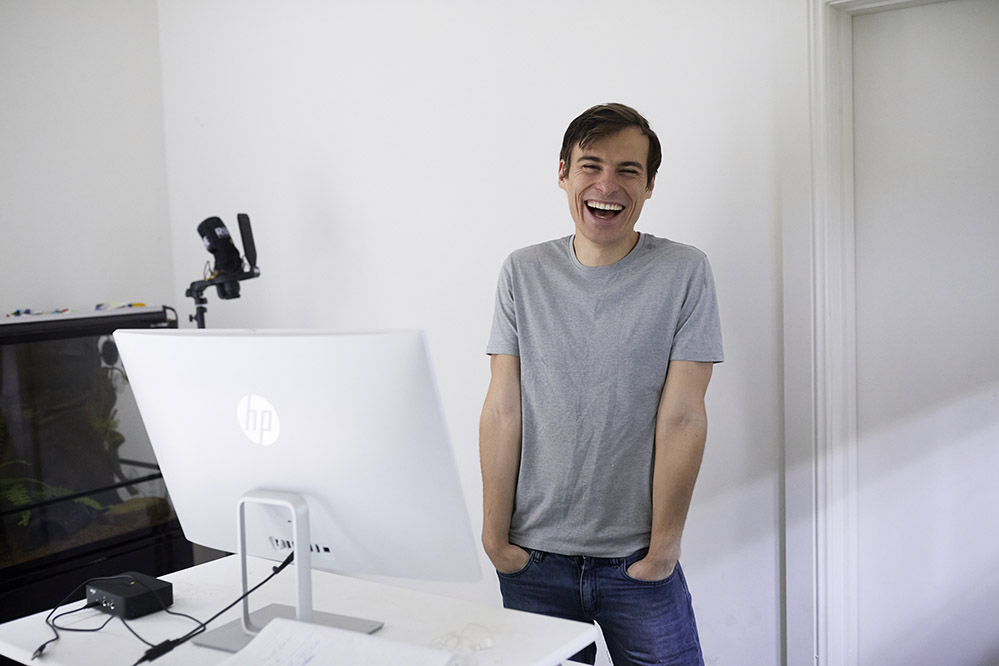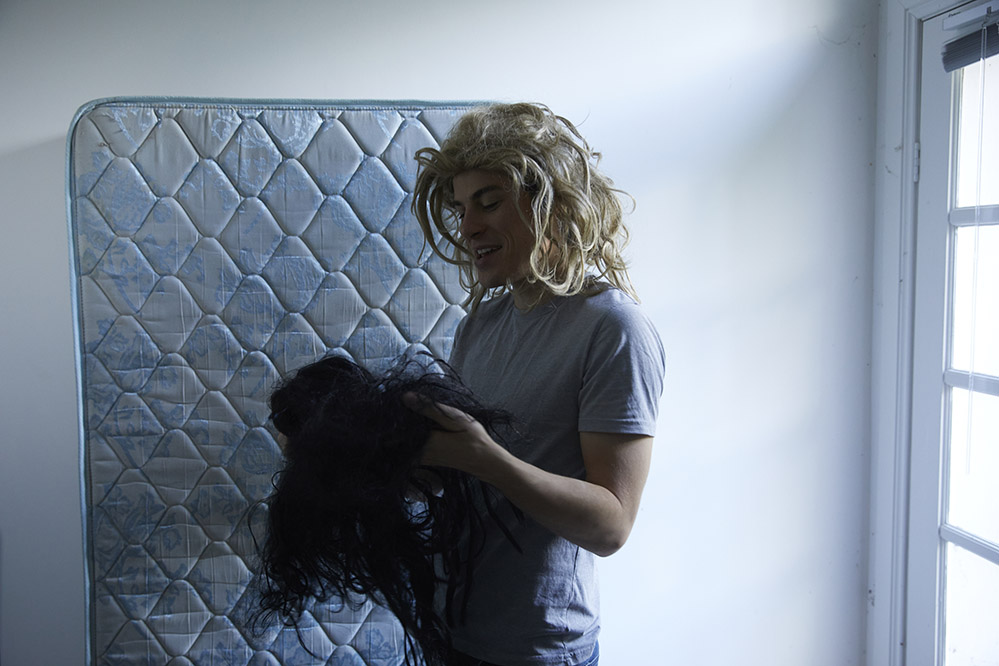Ken Leanfore for Rolling Stone
His contempt for progressive darlings is equal to his loathing of conservative mouthpieces. Andrew P Street meets media watchdog and comedian Jordan Shanks.
Like every other performer in Australia Jordan Shanks is unable to tour. Unlike most other performers in Australia, that’s not necessarily a career-extinguishing problem. For Shanks, the phones of the nation are his stage and no mere coronavirus can cancel him.
His main YouTube channel, Friendlyjordies, recently racked up its four-hundred-and-fifty-thousandth subscriber. He’s regularly courted by media organisations to bring his unique mix of well-researched political savvy and gloriously childish name-calling to their services – requests he gleefully refuses, often making a video about it in the process. Among young Australians he’s infinitely more recognisable an authority on Australian politics than anyone on the ABC’s Insiders couch, or at The Australian’s Canberra bureau.
If it was up to Shanks, however, he’d be kicking back in… um, Lithgow?
“I lived in Lithgow for a year and a half and that was the best year and a half of my life. Loved it,” he emphasises. “I really like living around rough people with few teeth staring menacingly at you for walking into Coles instead of Woolworths, you know?”
“I really like living around rough people with few teeth staring menacingly at you for walking into Coles instead of Woolworths, you know?”
The 30-year-old comedian and former political science student is not joking either, probably. “I think it’s the thing Stephen King’s always talking about,” he explains. “Living in really unglamorous towns, a lot of woodland around you as well, that is the perfect environment. Somewhere there’s nothing else to do but focus on writing. And you hear the occasional evil clown, sure, but that just adds to it.”
Shanks has lived all over the place, from Korea to rural NSW (“I moved there with my parents, because when Sea Change was big they thought that was a good idea”). Necessity, however, drew him back to his childhood home of Sydney because his channels require serious attention, and presumably fewer evil clown attacks.
Love Music?
Get your daily dose of everything happening in Australian/New Zealand music and globally.
Said channel has been steadily rising in popularity since he started it seven years ago, which is itself almost unheard of in the YouTube rantscape.

Photo by Ken Leanfore for Rolling Stone
Similarly unusual are his politics. The Friendlyjordies channel spent its first two years mainly churning out ocker-flavoured comedy before Shanks’ passion for Australian democracy and the endless theatre of parliament took a central role. Unlike most politics nerds however, he grasped the need to be entertaining. “I see it’s important, unlike most people with degrees in politics who just sound like they’re reading the NASDAQ for CommBank.”
While an outspoken believer in unions and a regular critic of the current government, he’s certainly not by-the-book left. He’s light years from the raft of right-wing YouTubers breathlessly declaring implausible conspiracy theories, and his contempt for progressive darlings like the Greens and the ABC is equal to his loathing of the conservative Murdoch press and Sky News.
Indeed, if there’s one huge obsession in the Jordan-sphere it’s the failures of the media generally — specifically, with how compromised they are by their owner’s conservative connections in the former case and the constant terror of criticism in the latter.
“Most of the politics which they discuss is discussed through the filter of trying to keep their job – so they say nothing controversial, nothing of substance, certainly nothing of importance,” he says of the national broadcaster.
“Most of the politics which [the ABC] discuss is discussed through the filter of trying to keep their job.”
“So what is there to be passionate about? If you’re going to sit there on the ABC going ‘A Labor politician said this, and then a Liberal politician said that,’ would you want to get out of bed in the morning? That limits you, being constantly on guard and thinking ‘have I said the right thing?’”
And his audience reach is remarkable by typical Australian standards. His posts regularly top half a million views, with some – such as his one explaining Clive Palmer’s attempted (and quietly aborted) $500k defamation suit after Shanks memorably called him “a dense Humpty Dumpty” and “Fatty McFuckhead” – easily topping a million. The man gets more viewers than many actual news broadcasters.
That mix of accessible politics and distinctly Aussie humour also appeals to an especially hard to reach and politically disengaged demographic: men aged 18-35. That’s why the Australian Council of Trade Unions enlisted him as part of their voting campaign for the 2016 election; a fact largely unmentioned until Buzzfeed ran a breathless story on the subject, beginning a colourful enmity which continued until the site’s closure this year.
And that demographic has created some issues of its own. His audiences at live shows are overwhelmingly male, and his relatively recent sideways shift into self-help on his own personal YouTube channel – a place which he sincerely claims gives him “profound joy” – suggests a possible reach for the (Friendly?) Jordan Peterson market. And while researching this story it seemed that for everyone who praised Shanks’ political messaging and entertainment savvy there was someone who spoke of being trolled relentlessly by his passionate-to-the-point-of-aggressive online audience.
Even so, he has some high-powered admirers, including a mutual fandom with former Australian Prime Minister Kevin Rudd.
“He’s a funny bloke and pretty sharp too,” the ex-PM says. “He’s also got an authenticity about him, and he’s genuinely trying to keep Australians informed. In a country like Australia, where the media is so concentrated in the hands of Uncle Rupert [Murdoch], there’s always a need for new media voices – especially voices that are young and progressive. Time will tell how effective he will be, but he is certainly attuned to the sentiments of many Australians.”
Similarly, columnist, playwright, and union activist Van Badham thinks he’s the future. “I think he’s got good, refreshing, organic left-laborist politics and the fearlessness to take them mainstream.”

Photo by Ken Leanfore for Rolling Stone
And that future is evolving. Until about two years ago he was putting out one or two videos a week on Friendlyjordies – elaborate affairs with multiple characters and elaborate costume changes, including his cruel but hilariously effective portrayal of Malcolm Turnbull as a bewigged Georgian-era lord.
These days, however, it’s all about speed and volume. Hours of makeup application and ruff-primping are a thing of the past.
“Friendlyjordies has turned into a hybrid of late-night monologues and filmed radio segments,” he explains with a sigh. “It’s a lot more instantaneous, purely because we’re slaves to the algorithms like everybody else. And before they used to reward quality content, now they reward quantity. Maybe I should work in a sweatshop in China, that might be more fulfilling.”
“Maybe I should work in a sweatshop in China, that might be more fulfilling.”
Shanks’ comedy career started with what he describes as “Australia’s very sad, disorganised version of the Saturday Night Live trail,” he laughs. “You win Class Clowns in high school because you’re slightly more confident than the other year niners and thus get an inflated sense of skill as a result of beating other 15-year-olds who are too scared to be on stage, and I just kept going from there.”
His first stage time was at five years old during after-school classes: an early indication of the single-mindedness to come. “You know how a lot of parents are pushing their children to be doctors or lawyers, like it’s the only thing they can be? I think I did that to my own brain,” he laughs. “It was, ‘You’re going to be a comedian and that’s it, I don’t want to hear any of this pie in the sky ‘do engineering’ or ‘getting a job at the local council’ nonsense!’”
From there he took the tried and true path of university revues which created much of the Sydney comedy scene; only to find that the historically direct path from a university stage to a TV or radio gig had been erased before him.
“The people who were doing those shows and doing internships just weren’t getting results,” he says. “So they all kind of fell to the wayside, but I noticed that it was people like Neel Kolhatkar and Nat Tran who were really getting traction on the internet, so I just moved the model.”

Photo by Ken Leanfore for Rolling Stone
Freed of the gatekeepers of Australian media, he discovered the “ultimate creativity and freedom” of putting his work to audiences directly online. “And there’s a meritocracy to it. If there’s an audience for you, you will be rewarded. Yes, the algorithms are demanding, but at the end of the day the rules are clear and very followable. They show you exactly what they want.”
“Yes, the algorithms are demanding, but at the end of the day the rules are clear and very followable. They show you exactly what they want.”
And they take that away too. Shanks was one of the many, many artists left reeling in 2018 by the change to Facebook’s algorithms when they abruptly abandoned video.
Since then he’s focussed on Twitter and YouTube because; “I really don’t understand Instagram. The whole appeal is just ‘my life’s better than yours’, right? And TikTok lip-synching is just really lazy karaoke. But their algorithm is really, really favourable at the moment. I guess because Silicon Valley just got everyone’s data and thought ‘right, start charging people for content!’, but China haven’t quite started that yet, so now there’s a market. Anything gets 100,000 views on TikTok.”
The question is, where does he go from here? Does he seriously want to be, as he announced earlier this year, the next Rupert Murdoch by the time he’s 50 – especially given the amount of time he’s spent criticising the stranglehold he has on Australia’s media? He laughs. “Wouldn’t it be amazing if that worked!”
After all, if Jordan’s politics were slightly less unionist and more conspiracy theory-esque, he’d have his own late-night Sky News show by now. And perhaps not surprisingly, he’s a fan of US right-wing conspiracy theorist hucksters like Alex Jones; “purely because of their art. I mean, compare that with the modern-day Cicero that is Ross Cameron,” he spits.
Does the US just do ranting nutjobbery better?
“Sometimes, yes. For example, [Fox News’ talking head Sean] Hannity is a complete hack, but you look at Tucker Carlson, or Bill O’Reilly back in the day. And there’s nothing like Alex Jones in the world. He’s a once in a lifetime performer; no-one is more engaging.”
Really? That gibbering red-faced loon that screams about school shootings being peopled by “crisis actors” between hawking his range of anti-5G health supplements?
“Oh, I can listen to four hours of that man yelling, and it’s like a lullaby for me,” Shanks retorts. “He’s talking about conspiracies with coronavirus being released deliberately by the Chinese so they can sequester Google, and [contented sigh] ahhhhhhh: I’m out like a light! I feel at peace, everything’s right in the world.”
Our blood pressures are presumably very different, it would appear.
“I mean, I wish we had those sort of characters in Australia. All credit to Alan Jones and Ray Hadley, they do a bang-up job, and John Laws is the finest of his generation – he might have pioneered that genre. Here, radio is where it’s at. I think Andrew Bolt is actually a good writer and that’s where it should have ended. He’s the Tina Fey of political commentators: great writer, not a fantastic performer.”

Photo by Ken Leanfore for Rolling Stone
So if that’s how the right get their message across, is the left missing a trick by lacking a charismatic ranting loon?
There’s a long pause. “It’s a good question. But I mean, there’s just no industry for a left-wing Alex Jones, because what corporation would fund it? And even on the internet, and I’m definitely not saying I’m immune to this, but [with progressive voices] there’s often this smug piousness which I find very off-putting. I mean, Noam Chomsky is definitely the most boring man I have ever seen in my life. People like Alex Jones have an audience for a reason: they’re good storytellers, they’re good explainers, and they’re charismatic.”
“I think I’m the same person when I’m recording. It’s pretty obvious when I’m putting on a character: I’m wearing a wig. Other than that, it’s pure Jordan.”
Unlike such performers though, he takes issue with the idea that he’s playing a character or that there’s any distance between the Jordan on camera and the one that does laundry or misses calls during interviews. “There’s none,” he bluntly responds. “I think I’m the same person when I’m recording. It’s pretty obvious when I’m putting on a character: I’m wearing a wig. Other than that, it’s pure Jordan.”
One can only imagine the relief he felt at the news of Turnbull’s resignation from parliament. “It was a magical moment,” he confirms. “It meant that I’ll never again have to go to an airport and explain to security why exactly I’m carrying a Mozart wig.”



































